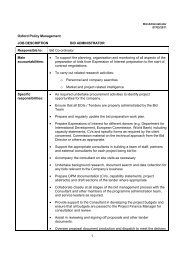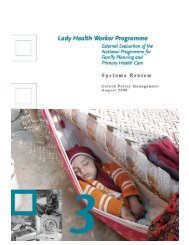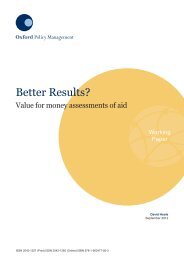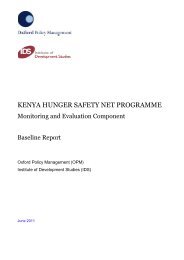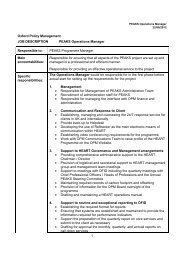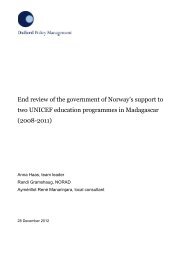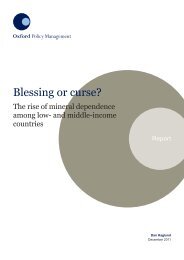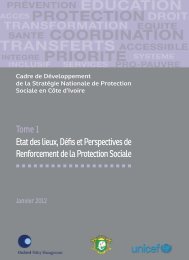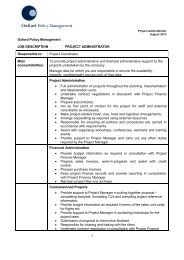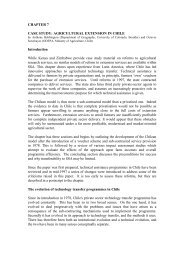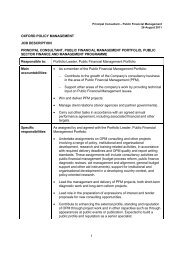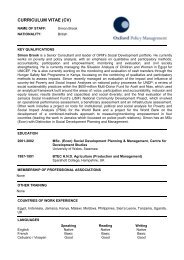LHW Management Review - Oxford Policy Management
LHW Management Review - Oxford Policy Management
LHW Management Review - Oxford Policy Management
Create successful ePaper yourself
Turn your PDF publications into a flip-book with our unique Google optimized e-Paper software.
Strategic and management controls<br />
However, it has remained a nationally funded and directed Programme, with Programme policies and<br />
standards being the responsibility of the federal government. One justification has been that the<br />
Programme ‘redresses an historical weakness in primary health services to villages and to poor urban<br />
women’. And that ‘ there needs to be evidence of a significant shift in those social attitudes at the<br />
provincial, district and local levels before key levers of control over the Programme are delegated or<br />
devolved or the Programme will fail’. 22<br />
The decision reflected in the Strategic Plan was for the Programme to remain, in the medium term, as<br />
a high-profile, nationally-funded and nationally-directed programme, signalling government’s intent to<br />
tackle inequity and modelling an effective way of doing it. The strategy was to extend and consolidate<br />
the Programme at the village level, which would contribute to the national goal of enhancing long-term<br />
local governance and participation; where the provincial government could provide accountability, the<br />
levels of delegation could be increased. 23<br />
During the course of this PC-1, it was planned to have a further decentralisation of powers in a<br />
phased manner. This decentralisation/devolution was to be piloted in selected districts/provinces in<br />
tandem with the development of mechanisms that would ensure accountability for results. This would<br />
need to be accompanied by capacity-building at all levels, strengthening of Programme management<br />
information systems, and demonstration of increased involvement at the district and provincial levels.<br />
4.3 <strong>Review</strong><br />
4.3.1 Mechanisms in place, but not used<br />
In 2003, the Programme was well aware of the risks of relying on capacity in central<br />
agencies, and even their own ministry, to control and drive Programme development. The<br />
leadership of the Programme ensured that the results from the 3rd Evaluation were widely<br />
communicated, and used as a basis for gaining the consensus and funding necessary to<br />
develop the Strategic Plan and the PC-1. 24<br />
The two oversight committees, the Programme <strong>Review</strong> Committee and the Inter-Provincial<br />
Committee on Decentralisation, were established to ensure momentum. Unfortunately, these<br />
committees never met during the period under review. The first meeting of the Provincial<br />
<strong>Review</strong> Committee was called in October 2008, with the objective of: reviewing progress to<br />
date, reviewing the proposals for a change to the target recruitment of <strong>LHW</strong>s from 100,000<br />
to 200,000, and providing guidance on how the Programme should deal with the national<br />
financial crises that were resulting in low availability of funds.<br />
In addition, the role of National Advisor – which was designed to support Programme<br />
development by coordinating activities with the provinces, and planning and piloting<br />
strategies for the future – remained vacant after September 2005.<br />
Most of the activities planned to support the delegation of decision-making did not take place<br />
(Table 4.1).<br />
22<br />
Strategic Plan: p 16.<br />
23<br />
Strategic Plan: p. 16.<br />
24<br />
This is the fourth external evaluation (4th Evaluation) of the Programme. The first and second evaluations were held in 1995<br />
and 1996, respectively, followed by the third evaluation (3rd Evaluation) conducted between 1999 and 2001.<br />
17



